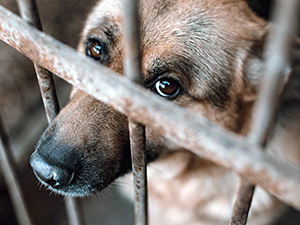Animal cruelty is a deeply troubling issue that affects countless innocent creatures worldwide. It is important to shed light on this problem and understand its impact. Animal cruelty refers to any harmful or abusive treatment inflicted upon animals, whether intentional or unintentional. This article aims to raise awareness about the prevalence of animal cruelty, its various forms, and the significance of preventing such acts of harm.
Forms of Animal Cruelty:
Animal cruelty can take different forms, each causing immense suffering to our fellow creatures. Physical abuse involves inflicting pain, injury, or even death upon animals through acts of violence, such as hitting, kicking, or neglecting their basic needs. Neglect, another form of cruelty, occurs when animals are deprived of proper food, water, shelter, or medical care, leading to severe health issues and even death. Additionally, animal cruelty can extend to emotional abuse, where animals are subjected to fear, confinement, or isolation, causing significant distress and psychological trauma.
Causes and Consequences:
Understanding the root causes of animal cruelty is crucial in addressing this issue effectively. Some individuals may engage in animal cruelty due to a lack of empathy or a distorted sense of power and control. Others may be influenced by societal factors, such as exposure to violence or a lack of education regarding animal welfare. The consequences of animal cruelty are far-reaching, not only for the animals themselves but also for society as a whole. Animals subjected to cruelty often suffer physically and emotionally, experiencing pain, fear, and trauma. Moreover, studies have shown a link between animal cruelty and an increased likelihood of engaging in violent behavior towards humans, highlighting the importance of addressing this issue promptly.
Prevention and Intervention:
Preventing animal cruelty requires a collective effort from individuals, communities, and authorities. Education plays a vital role in raising awareness about animal welfare and promoting empathy towards animals. Teaching young individuals about responsible pet ownership, compassion, and the importance of treating animals with kindness can help foster a more compassionate society. Additionally, reporting suspected cases of animal cruelty to local animal welfare organizations or authorities is crucial in ensuring that appropriate action is taken to protect the animals involved.
The Role of Laws:
Laws and regulations play a significant role in combating animal cruelty. They should be in place to protect animals from harm and ensure that those who engage in such acts are held accountable. Stricter penalties and enforcement of animal cruelty laws can act as deterrents and send a clear message that animal cruelty will not be tolerated. Furthermore, supporting animal welfare organizations and advocating for stronger animal protection laws can contribute to creating a safer and more compassionate environment for animals.
Conclusion:
Animal cruelty is a heartbreaking reality that demands our attention and action. By understanding the various forms of cruelty, its causes, and the consequences it entails, we can work towards preventing and addressing this issue effectively. Promoting education, empathy, and responsible pet ownership, along with robust legislation and enforcement, are crucial steps in creating a world where animals are treated with the care and respect they deserve. Together, we can make a difference and put an end to the suffering endured by countless innocent creatures.






